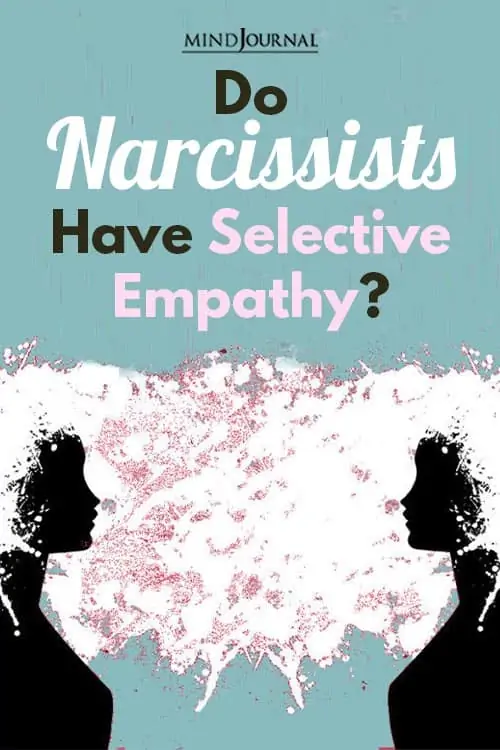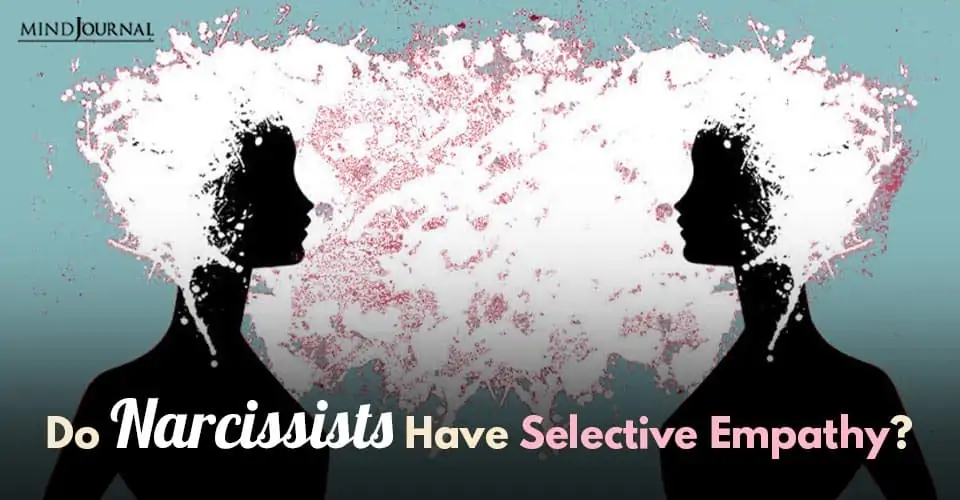When it comes to narcissism, one of the biggest and most intriguing questions is whether narcissists have selective empathy, or not.
When you encounter someone who has strong traits of narcissism, it’s natural to start questioning everything. That’s what I did too, so I get it.
And one big question on my mind was, “Can narcissists have selective empathy?”
The answer I’ve found is a bit complicated and can vary from person to person. Ultimately, the answer is yes, but it definitely helps to have an understanding of narcissism to get to the bottom of the question.
What is narcissism?
If you’re looking for an answer to the selective empathy question, I’m going to assume you have some understanding of narcissism. So I’m going to keep this section brief. But I can’t skip it. The answer to the question actually lies in the definition of narcissism, so we’ve got to go here.
When someone talks about narcissism or labels someone as a narcissist, they’re usually talking about a Narcissistic Personality Disorder (NPD).
It’s important to make this distinction because we’re all narcissistic on some level.
Related: How Narcissists Fool You With False Empathy
The more you let your ego control your life, the more narcissistic you will be. But people with NPD meet certain clinical diagnostics and are likely to be emotionally abusive.
In order to be diagnosed with narcissism, you must exhibit five of the following nine characteristics according to the Diagnostic and Statistical Manual of Mental Disorders (DSM-IV).
1. Grandiose sense of self-importance – they may exaggerate their talents or accomplishments.
2. Pre-occupied with fantasies of power, success, beauty or love – Someone with NPD may be obsessed with achieving power, money or an ideal partner.
3. Feelings of being special – This person may believe that others couldn’t possibly understand them. This is usually the “one-upper” type of person who has experienced more pain or achievements than anyone else.
4. Need to be admired – This person may need to be admired for simply existing. They need thanks and praise for anything they do, regardless of how minor.
5. Strong sense of entitlement – These are the people who cut to the front of the line because they believe it’s their right.
6. Comfortable exploiting others – If someone falls into this category, they are likely master manipulators and often use people to get what they want.
7. Has impaired empathy – This person may be unable/unwilling to identify with other people’s emotions.
8. Is often jealous – Many narcissists are jealous and/or believe others are jealous of him or her.
9. Exhibits arrogance with others – Many narcissists are arrogant by nature. Some hide it better than others, but if you’re close to this person, it’ll be obvious.
The DSM-IV is an easier guide for laymen to follow in determining whether they’re dealing with a narcissist, but for diagnostic purposes, it was updated in 2011. The DSM-5 criteria include:
1. Impairments in personality functioning AND impairments in interpersonal functioning (including impaired empathy).
2. Antagonism (grandiosity) and attention seeking.
3. Exhibiting above traits consistently across time and situations.
4. Above traits are not part of a normal developmental stage or socio-cultural environment.
5. Above traits are not a merely a natural result of substance abuse.
Understanding empathy
Many people confuse empathy and sympathy. But in the case of the narcissist, this is another important distinction.
Empathy is the ability to understand and relate to someone else’s emotions.
Sympathy is feeling pity for someone.
Narcissists can have a lot of sympathy yet struggle with empathy.
Here’s an example of a sympathetic thing a narcissist may believe:
Poor thing… she actually thinks she can live without me.
But if you had empathy for someone you’ve hurt, you wouldn’t keep hurting them.
Related: How Do Narcissists Think And Work?
Why narcissists have impaired empathy?
As an empath, I’d love to be able to say that empathy is inherent in all of us. But all the research we have tells us the opposite. Empathy is a learned trait (and being an empath isn’t exactly the same).
But that’s probably why many narcissists have impaired empathy.
Most have experienced some level of neglect or abuse in childhood, and so they rely on the ego for protection.
To avoid the pain of abuse, narcissists learn to manipulate situations to their advantage. In this way, they regain control. But they couldn’t achieve the level of control they require with pesky empathy weighing them down.
Empathy would demand that they face any pain or injustice they inflict upon another. And pain is exactly what they’re trying to avoid.
So for most narcissists, empathy is a useless tool. In fact, it would be counterproductive to their mission.
Can narcissists have selective empathy?
According to the DSM-5 criteria, all narcissists have impaired empathy.
And if you’ve had an encounter with a narcissist, this makes perfect sense. But in order to explore the answer to this question, we must take a close look at the word impaired.
Impaired empathy means that their empathy is malfunctioning. It’s not whole.
It doesn’t mean that it’s non-existent.
So can narcissists have selective empathy? Yes.
But if you’re trying to get to the bottom of this question, you’re probably wondering whether the narcissist in your life was ever genuine.
And here’s the hard truth…
You’ll never know, and it doesn’t really matter anyway.
Most narcissists are master manipulators. And since narcissism is on a spectrum, one narcissist may have more empathy than another. But you’ll never know whether you’re seeing true empathy or a master manipulation.
And here’s why it doesn’t matter.
You would have never learned about narcissism if this person had your best interests at heart. You’re here because this person manipulated and hurt you.
Do they have some redeeming qualities? I’m going to bet they do.
But as far as you’re concerned, their empathy or lack thereof isn’t of any consequence anymore. Your job right now is to heal and move past this (as much as possible).
Written By Common Ego Originally Appeared In Common Ego









Leave a Reply
You must be logged in to post a comment.